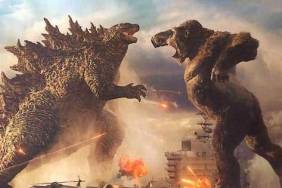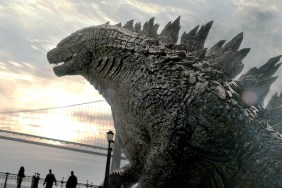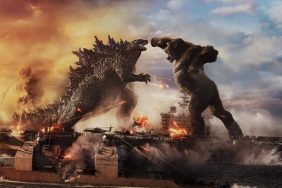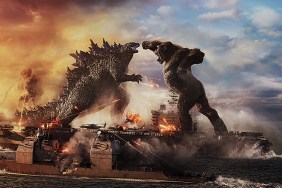Godzilla vs. King Ghidorah


Release Date: 14th December, 1991
Monster: King Ghidorah
Description: Golden flying three-headed dragon
Origin: Mutated dorats, left in the past by careless time travelers
Destruction: King Ghidorah destroys Godzilla
Actor(s): “Hurricane Ryu” Hariken (King Ghidorah), Kenpachiro Satsuma (Godzilla)
Ancillary Monster: Godzillasaurus (see below)
Ancillary Monster: Dorats (see below)
We’re into the 1990s now, and the special effects have likewise improved, although Godzilla doesn’t exactly have Jurassic Park money, so he’s still played by a man in a suit. Godzilla, I mentioned was redesigned in the last movie, and now looks more articulated, with smaller, meaner eyes, a flatter head, and a bigger grimace. He’ll be redesigned again in 1999, to be even meaner-looking still. However mean and scary you make Godzilla, though, he still has enough cultural clout to have a note of badass heroism in him.
Godzilla vs. King Ghidorah is wildly bonkers, and feels like a return to form after the last two movies. For one, it’s a time travel plot, and for another, it deals largely with the origins of the various monsters on display. We know that Godzilla was created by a nuclear blast, but there was some ambiguity as to whether or not Godzilla was a long-lost dinosaur that was mutated by radiation, or if he was various seabound lifeforms that merged together to make a Godzilla (“Gojira,” to remind you, is a portmanteau of “kujira” and “gorira” the Japanese words for whale and gorilla). In this film, it’s finally stated explicitly what Godzilla is: Godzilla is a benevolent tyrannosaur that was discovered in 1944, and lived on the Bikini Atoll when bomb testing commenced there. Radiation turned a regular dinosaur into Godzilla. How the tyrannosaur escaped extinction is never explained, but we do get to see Godzilla in 1944, and he looks like he’s already halfway between a dinosaur and a monster. I always assumed that Godzilla was more amphibious than reptilian, but there you have it. Godzilla is a mutant dinosaur.

We also see the origin of King Ghidorah, who was previously a space-bound alien dragon who tooled around the cosmos in a giant meteor thing, and who hasn’t been seen for nearly 20 years. In this film, we establish a future (AD 2204), where King Ghidorah has been killed, and whose two-headed corpse lays on the ocean floor. Some time travelers go back to 1992 to claim that Japan will have been destroyed by Godzilla, and that King Ghidorah was destroyed. The time travelers, talking to a veteran of WWII, learn that there was a tyrannosaur present at a vital battle. The time travelers – along with Miki (Megumi Odaka), and their android (Robert Scott Field) – go back in time to 1944 to destroy the tyrannosaur, preventing it from becoming Godzilla and destroying Japan in several hundred years. It’s the Terminator approach. However, one of the time travelers (Kiwado Harada) accidentally leaves behind some Dorats in 1944. Dorats are little wined green-haired bat monsters about a foot tall. They are kept as pets in the future. When our heroes return to 1992, they find that there is indeed no Godzilla, but that the nuclear tests that made Godzilla now did their magic on those Dorats, who merged and mutated and formed King Ghidorah. D’oh.
King Ghidorah looks largely the same as in previous movies, and I like the time travel origin. I just hope that this doesn’t set a precedent, and people don’t being regularly going back in time just to make mutant monsters in 1944 nuclear tests. So there’s no Godzilla, but there is a King Ghidorah. What have we learned from previous Godzilla movies? That a Godzilla can beat up a King Ghidorah. Using new nuclear tests, our heroes manage to hastily create a new Godzilla who looks and acts exactly like the old one. Creating monsters is really, really easy in this movie. Godzilla, of course, wails on King Ghidorah, and beats up the dragon without too much hassle. There seems to be a kind of monster inevitability with the Godzilla movies. We are inexorably drawn to a Godzilla. We can destroy him, but he always returns.

Of course, in the Heisei era, Godzilla is still an uncontrollable and destructive force, so as soon as he kills King Ghidorah, he begins on a mindless rampage, where he starts smashing up everything for no good reason. I guess this new Godzilla is meaner than the last. It’s certainly bigger. What else can one do to fight a Godzilla than… get another Ghidorah. Yes, the cycle continues, and the time travelers no go forward in time to retrieve the dead Ghidorah off of the ocean floor in 2204, and outfit it with a mecha third head and mechanical wings and missiles and stuff. The final battle is between the new Godzilla and Mechaghidorah.
A cute joke: A young soldier in 1944 looks in awe at the dinosaur and remarks at how amazing it looks. His superior officer laughs at him and says that he should tell his unborn son about it. The soldier’s name is Spielberg. Tee hee.
So what with the time traveling and androids and causality and Mechaghidorah, we’re back again to a pleasantly crazy Godzilla style that feels like the product of a 10-year-old boy’s imagination. I was afraid everything would be dank and serious like in the disappointing Godzilla 1985, but the spirit lives on. Of course, now Godzilla is dead, so I’m eager to see how he’ll come back in the next film.
But that will have to wait until next week, my monsters. Next week, I’ll be wrapping up the Heisei era, running the series through 1995, and revisiting a classic friends (Mothra and Mechagodzilla will return) and meeting some new creatures like Space Godzilla and the evil Destroyah. The following week, I will be covering the infamous 1998 American Godzilla movie (the one that many of you have already seen), and beginning on the third and final era, the Millennium era, which began with Godzilla 2000. We go onward my friend. Roar with me.
Witney Seibold is a featured contributor on the CraveOnline Film Channel, co-host of The B-Movies Podcast and co-star of The Trailer Hitch. You can read his weekly articles B-Movies Extended, Free Film School and The Series Project, and follow him on “Twitter” at @WitneySeibold, where he is slowly losing his mind. If you want to buy him a gift (and I know you do), you can visit his Amazon Wish List.








